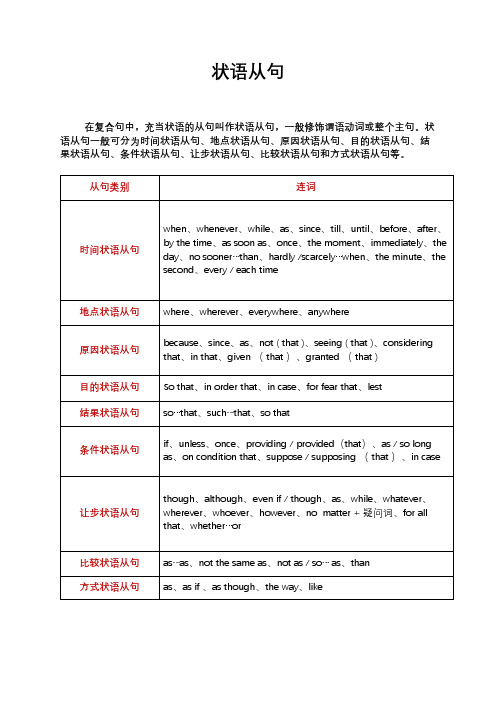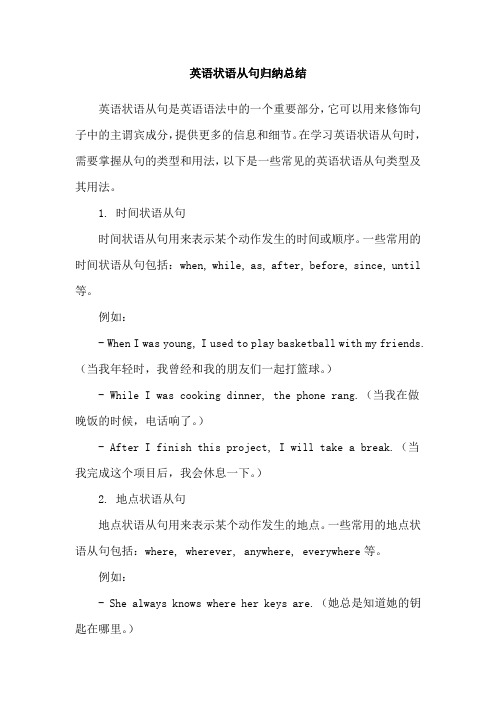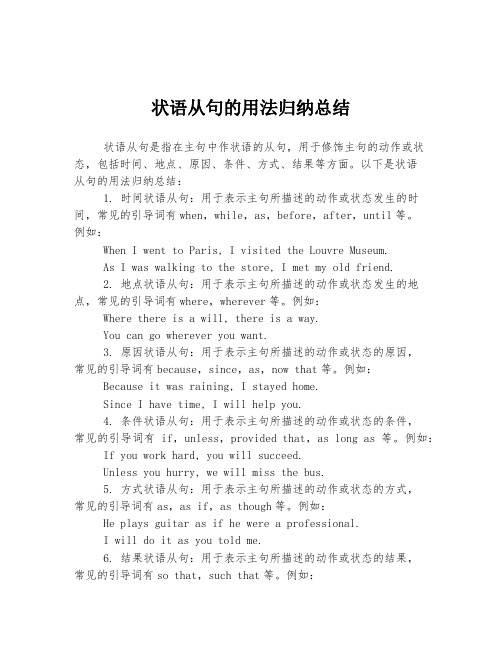英语语法状语从句的归纳总结
英语语法:状语从句归纳整理

状语从句在复合句中,充当状语的从句叫作状语从句,一般修饰谓语动词或整个主句。
状语从句一般可分为时间状语从句、地点状语从句、原因状语从句、目的状语从句、结果状语从句、条件状语从句、让步状语从句、比较状语从句和方式状语从句等。
一、时间状语从句在复合句中起时间状语作用的从句称为时间状语从句,可放在句首、句中或句尾。
(二)until 和 till的用法1.肯定句:主句的谓语动词必须是延续性动词,主句、从句都为肯定式,意为“直到……为止”;2.否定句:主句的谓语动词必须是非延续性动词,从句为肯定式,表示“某动作直到某时才开始”;3.till 不可以置于句首,而until可以。
例:They waited till / until I returned.他们一直在等我回来。
You may stay here until / till the rain stops.你可以待在这里直到雨停。
He won’t go to bed until / till she returns.直到她回来,他才上床睡觉。
Until you told me I had no idea of it.直到你告诉我,我才知道这件事。
(三)since的用法(四)before的用法一般情况下before表示“在……之前”,有时根据上下文,还可表示“还未……就……” “不到……就……” “……才……” “趁……还未……”等例:Please write it down before you forget it.趁你还没忘,请把它记下来。
I must finish this letter before I go home.我必须在回家之前完成这封信。
Before I could get in a word, he had measured me.我还没来得及插话,他就给我量好了尺寸。
We had sailed four days and four nights before we saw land.我们航行了四天四夜才看到陆地。
英语状语从句归纳总结

英语状语从句归纳总结英语状语从句是英语语法中的一个重要部分,它可以用来修饰句子中的主谓宾成分,提供更多的信息和细节。
在学习英语状语从句时,需要掌握从句的类型和用法,以下是一些常见的英语状语从句类型及其用法。
1. 时间状语从句时间状语从句用来表示某个动作发生的时间或顺序。
一些常用的时间状语从句包括:when, while, as, after, before, since, until 等。
例如:- When I was young, I used to play basketball with my friends.(当我年轻时,我曾经和我的朋友们一起打篮球。
)- While I was cooking dinner, the phone rang.(当我在做晚饭的时候,电话响了。
)- After I finish this project, I will take a break.(当我完成这个项目后,我会休息一下。
)2. 地点状语从句地点状语从句用来表示某个动作发生的地点。
一些常用的地点状语从句包括:where, wherever, anywhere, everywhere等。
例如:- She always knows where her keys are.(她总是知道她的钥匙在哪里。
)- Wherever he goes, he takes his laptop with him.(无论他去哪里,他都带着他的笔记本电脑。
)3. 原因状语从句原因状语从句用来表示某个动作发生的原因。
一些常用的原因状语从句包括:because, since, as, now that等。
例如:- Because it was raining, we decided to stay indoors.(因为下雨了,我们决定呆在室内。
)- Since you didn't like the movie, we can watch something else.(既然你不喜欢这部电影,我们可以看其他的。
高中英语语法总结之状语从句(共37张ppt)

• Difficulties are nothing if we are not afraid of them.如果我们不怕困难,困难就算不了什 么了。
• We shall go there tomorrow unless it rains. = We shall go there tomorrow if it doesn’t rain. 除非下雨,我们明天就去那里。
• Every time I travelled by boat, I got seasick.我 每次乘船都晕船。
• The moment I heard the song, I felt cheerful. 我一听到这首歌,就感到很愉快。
• Next time you come ,you’ll see him.下次你来 的时候,就会见到他。
• We were not tired though (although) we had worked all day.虽然我们干了一天活,但并 不累。
• (2)even if, even though(even if 和even though的意思为“即使”“纵使”有退一步 设想的意味,多用于书面语中)。
• 5、结果状语从句:
• (1)so that,so…that(so that前有逗号为 结果状语从句,so…that的so后面跟形容词 或副词)。
• We turned up the radio, so that everyone heard the news.我们把收音机的音量放大, 大家都听到了新闻。
• Seeing (that) he was badly ill, we sent for the doctor.鉴于他病情严重,我们派人去请医生 去了。
初中英语知识点归纳状语从句的分类和用法

初中英语知识点归纳状语从句的分类和用法状语从句是英语语法中重要的一部分,它用来修饰主句的动作或描述情况的,在句子中起着状语的作用。
状语从句分为时间状语从句、条件状语从句、原因状语从句、目的状语从句、结果状语从句、方式状语从句和比较状语从句等。
下面将对初中英语中常见的状语从句分类和用法进行归纳。
一、时间状语从句时间状语从句用来表示动作或事件发生的时间,包括连词when (当...时候),while (在...时候),before (在...之前),after (在...之后),as (当),since (自从),until (直到)等。
时间状语从句一般放在主句之前或者之后。
例如:- When I was young, I used to play soccer with my friends. (当我年轻的时候,我常常和朋友们踢足球。
)- After she finished her homework, she went to bed. (她完成作业之后,去睡觉了。
)二、条件状语从句条件状语从句用来表示主句动作的条件或前提,包括连词if (如果),unless (除非),in case (以防),as long as (只要),provided/providing (只要)等。
条件状语从句一般放在主句之前。
例如:- If it rains tomorrow, we will stay at home. (如果明天下雨,我们就在家呆着。
)- Unless you work hard, you won't pass the exam. (除非你努力学习,否则你就不能通过考试。
)三、原因状语从句原因状语从句用来表示主句动作或情况的原因,包括连词because (因为),as (因为),since (因为),for (因为),now that (既然)等。
原因状语从句一般放在主句之前。
例如:- Because it was raining, we stayed at home. (因为下雨,我们呆在家里。
英语状语从句知识点归纳

英语状语从句知识点归纳一、引导方式状语从句的从属连词主要的有as, as if, as though等:You must do as your parents tell you. 你必须按你父母说的去做。
I have changed it as you suggest. 我已照你的建议作了改动。
I am as you can imagine short of money. 正如你能想像的我很缺钱。
Robbie didn’t feel as she did. 洛比没有她那种感觉。
They treated the child as if she were their own. 他们待这孩子像亲生的一样。
I remember the whole thing as if it happened yesterday. 整个这件事我记得很清楚,就仿佛是昨天发生似的。
【注】(1) 在非正式文体中,like也可用连词,表示方式,与as的用法相似:Nobody loves you like I do. 没有人像我这样爱你。
She can’t cook like her mother does. 她菜做得没有她妈那样好。
(2) 有时the way 也可用作连词,表示方式,与as的用法相似:They didn’t do it the way we do now. 那时他们不像我们现在这样行事。
I can’t help seeing things the way they do. 我禁不住也像他们那样看事物。
二、as if [as though] 从句与虚拟语气一般说来,若as if 和as though 从句所表示的内容可能为事实,则用陈述语气,若为假设或不大可能为事实,则用虚拟语气。
不过在非正式文体中,有时即使句意明确地表示不是事实,也可能用陈述语气:He treats me as if I am [were] a stranger. 他待我有如陌生人。
状语从句的用法归纳总结

状语从句的用法归纳总结状语从句是指在主句中作状语的从句,用于修饰主句的动作或状态,包括时间、地点、原因、条件、方式、结果等方面。
以下是状语从句的用法归纳总结:1. 时间状语从句:用于表示主句所描述的动作或状态发生的时间,常见的引导词有when,while,as,before,after,until等。
例如:When I went to Paris, I visited the Louvre Museum.As I was walking to the store, I met my old friend.2. 地点状语从句:用于表示主句所描述的动作或状态发生的地点,常见的引导词有where,wherever等。
例如:Where there is a will, there is a way.You can go wherever you want.3. 原因状语从句:用于表示主句所描述的动作或状态的原因,常见的引导词有because,since,as,now that等。
例如:Because it was raining, I stayed home.Since I have time, I will help you.4. 条件状语从句:用于表示主句所描述的动作或状态的条件,常见的引导词有if,unless,provided that,as long as等。
例如:If you work hard, you will succeed.Unless you hurry, we will miss the bus.5. 方式状语从句:用于表示主句所描述的动作或状态的方式,常见的引导词有as,as if,as though等。
例如:He plays guitar as if he were a professional.I will do it as you told me.6. 结果状语从句:用于表示主句所描述的动作或状态的结果,常见的引导词有so that,such that等。
英语从句知识点总结

英语从句知识点总结(经典版)编制人:__________________审核人:__________________审批人:__________________编制单位:__________________编制时间:____年____月____日序言下载提示:该文档是本店铺精心编制而成的,希望大家下载后,能够帮助大家解决实际问题。
文档下载后可定制修改,请根据实际需要进行调整和使用,谢谢!并且,本店铺为大家提供各种类型的经典范文,如工作报告、致辞讲话、条据书信、合同范本、规章制度、应急预案、心得体会、教学资料、作文大全、其他范文等等,想了解不同范文格式和写法,敬请关注!Download tips: This document is carefully compiled by this editor. I hope that after you download it, it can help you solve practical problems. The document can be customized and modified after downloading, please adjust and use it according to actual needs, thank you!Moreover, our store provides various types of classic sample essays, such as work reports, speeches, policy letters, contract templates, rules and regulations, emergency plans, insights, teaching materials, essay encyclopedias, and other sample essays. If you want to learn about different sample formats and writing methods, please pay attention!英语从句知识点总结要想在成考英语考试中脱颖而出,首先还得对相应的从句进行复习。
2024年人教版中考英语语法课件:状语从句知识点归纳

Wherever my sister visits, she will send me a postcard. =No matter where my sister visits, she will send me a postcard.
as
当.....时, 一边...一边...
强调主从句动作同时进行
I saw the sun as I opened the window.
1、时间状语从句
2、until/ till 引导词: ① until和till意为“直到”,很多时候可以互换,但是用于句首的时候,常用until。 Until you get back, I will sit here.
3、让步状语从句
(表示主句中的某一动作或状态与从句中的某一动作或状态在意义上有部分矛盾。) 1、although/though 引导词: although/though意为“尽管,虽然”,不与but连用,但可用yet/ still. Although/ though he works hard, yet he makes slow porgress.
③ She is such a beautiful girl that everybody loves her.
4、结果状语从句
(结果状语从句表示主句中某一动ห้องสมุดไป่ตู้或状态所产生的结果)
4、so…that… 与 such… that… 互换: 两者都意为“如此......以致于”
so+形容词+a/an+单数可数名词+that从句 人称代=s词uc是h为+a了/a避n+免我形重们容复、词,他+用们单来/数代她可替们数前/名面它词提们到”+等t过h代a的t词从人。句、人事称物代等词名有词人的称词、,单主复要数包以括及“你格、的我变、化他。,她/它、你们、
- 1、下载文档前请自行甄别文档内容的完整性,平台不提供额外的编辑、内容补充、找答案等附加服务。
- 2、"仅部分预览"的文档,不可在线预览部分如存在完整性等问题,可反馈申请退款(可完整预览的文档不适用该条件!)。
- 3、如文档侵犯您的权益,请联系客服反馈,我们会尽快为您处理(人工客服工作时间:9:00-18:30)。
英语语法状语从句的归纳总结
在复合句中修饰主句或主句中的某一成分的从句叫状语从句。
状语从句通常由从属连词或起连词作用的词组引导,有时甚至不需要连词直接和主句连接起来。
状语从句根据它表达的意思不同,可分为时间、地点、原因、目的、结果、条件、方式、比较、让步等九类。
一、时间状语从句
时间状语从句是表示时间关系的从句。
可以引导时间状语从句的连词很多,根据意义和主从句之间的时间关系,通常可分为以下几种情况:
A.when, while, as, whenever
when, while, as表示主句谓语作和从句的谓语动作同时发生或几乎同时发生。
1.when
①when表示点时间时,从句中用短暂性动词;表示段时间时,用持续性动词。
When I got home, my family were already having dinner. 我到家的时候,全家已在吃晚饭。
(when表示点时间)
When they were still talking and laughing, the teacher came in. 当他们还在说笑的时候,老师进来了。
(when表示段时间)He waved ahello when he saw her.
当他看见她的时候,就挥手打了个招呼。
(when表示点时间)When you think you know nothing, you begin to know something. 当你认为自己一无所知的时候,就开始知道一些事情了。
(when表示段时间)
注意:
当when意思是正当……时候(and at that moment)时,when只能跟在前一分句之后。
He was about to go to bed when the doorbel rang. 他正要上床,忽然门铃响了。
They were watching the World Cup when suddenly the lights went out. 他们正看着世界杯比赛,突然灯灭了。
They had just arrived home when it began to rain. 他们刚到家,天就开始下雨了。
②有时when表示虽然,尽管的含义,相当于although或since。
He walks when he might take a taxi. 尽管可以打的,但他还是步行。
How can you hope for mercy yourself when you show none
既然你不宽恕别人,你自己又怎能希望得到别人的宽恕呢?
2.while
①while通常表示一段时间,从句中宜用持续性动词作谓语。
Strike while the iron is hot. 趁热打铁。
She fell asleep while she was reading the newspaper. 她在看报的时候睡着了。
②while有时可以作并列连词,表示对比,可译成……而……。
I am fond of English while he likes maths. 我喜欢英语而他却喜欢数学。
We slept while the captain kept watch. 我们睡觉而上尉担任警戒。
③while有时可引导让步状语从句,意思是虽然。
While they love te children, they are strict with them. 虽然他们都爱他们的孩子,但却对他们要求严格。
提示:
虽然during 与while 意思很相近,但是during是介词,不能引导从句。
3.as
①as表示点时间时,从句中用短暂性动词;表示段时间时,用持续性动词。
as和when两者经常可以通用。
The thief was caught as when he was stealing in the supermarket. 小偷在超市行窃时被逮住
了。
I saw Jim as when he left the meeting room. 吉姆离开会议室时候我看到了他。
②as表示一边……一边……,强调从句和主句中两个动作交替进行或同步进行。
They talked as they walked. 他们边走边聊。
He looked behind from time to time as he went. 他一边走,一边不时地往后看。
③as表示随着
As time goes on, it's getting warmer and warmer. 随着时间的推移,天气变得越来越暖了。
As spring warms the earth, al flowers begin to bloom. 随着春回大地,百花开始绽放。
4.when, while, as的用法区别
①只有当从句表示的是段时间,即其谓语动词有持续性特征时,这三者可以通用互换。
I got the news on the radio when while as I was having breakfast. 我在吃早饭的时候从收音机里获悉这一消息。
②在下列情况下,三者彼此之间不能替换使用:
a.as更强调同一时间或紧接的一前一后或伴随着的变化。
We listened to the singer sing as he played the guitar. 我们听着歌星边弹吉它边演唱。
I thought of it just as you opened your mouth. 你一张嘴我就知道你要说什幺
As he grew older, he became less and less active.
随着他年龄的增长,他变得越来越不活泼了。
提示:
状语从句可放在主句之前或之后,放在主句之前时一般用逗号与主句分开。
有时可置于主句中间,前后用逗号。
b.when更强调特定时间,还可表示从句中的动作先于或后于主句的动作。
When I had given Mary the spare ticket, I found my own already gone. 当我把多余的票给了玛丽时,我才发现我自己的票已不知去向。
(从句动作发生在主句之前,注意主从句的时态)
When I finally got there, he meeting had been on for ten minutes. 当我最终赶到那里时,会议已开始十分钟了。
(从句动作发生在主句之后,注意时态)c.while从句只能表示延续的动作或状态或主从句中动作的对比。
She thought I was talking about her daughter, while in fact, I was talking about my daughter.
她以为我在谈论她女儿,而事实上,我在谈论我的女儿。
d.若表示两个短促动作几乎同时发生时,用as场合多于when。
As he finished his speech, the audience burst into applause. 他结束讲话时,观众爆发出雷鸣般的掌声。
5.whenever
whenever是when的强势语,它描述的不是一次性动作,而是经常发生的习惯性动作。
You are always welcome whenever you come. 无论你何时来都欢迎。
Whenever we met with diffiulties, they came to help us. 每当我们遇上困难的时候,他们就来帮我们。
B.before, after
1.before
before表示在一段时间之前。
I must finish all the work before go home. 回家之前我必须干完所有的活。
You must first learn to walk before you try to run. 在想要跑以前,你得先学会走。
He had learned English for three years before he went to London. 他去伦敦之前已学了三年英语。
提示:before 从句往往带有否定的含义。
He ran off before I could stop him.
我还没来得及阻止他,他就跑掉了。
Thke it down berore you forget it. 趁着还没忘记的时候就记录下来。
